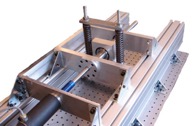Surveillance and behaviour monitoring : Angular approaches and non-stationary regimes
The theoretical framework developed in the previous models has also been accompanied by the development of characterisation tools in the angular domain and, above all, the taking into account of non-stationary operating conditions. The cyclo-non-stationary angle-time analysis proposed for the study of shot noise (S. Baudin thesis) established the basic theoretical tools opening up broad perspectives. The approach was then extended to rotor models in non-stationary conditions (thesis E. Sghaier) in order to better understand, for example, fatigue design for the passage of critical speed, which will certainly be more frequent in future applications of electrical machines. Finally, analysis tools based on artificial intelligence were also explored (post-doc I. Khelf) by comparing measurements and simulations of a complex machine (wind turbine) with a bearing fault, taking advantage of the angular sampling and speed information of this machine.
Contact : BOURDON Adeline, REMOND Didier

